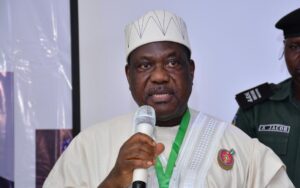NITDA seeks for synergy from IT stakeholders
The Director-General of the World Trade Organisation (WTO), Dr Ngozi Okonjo-Iweala, said the African continent needed more fiscal stimulus to engender economic growth and recovery.
Okonjo-Iweala spoke at the UBA Africa Conversations 2021 with the theme: “Africa to the World,” held virtually to commemorate Africa Day on Tuesday in Lagos.
She noted that other developed countries were employing fiscal stimulus for economic growth recovery.
“On catalysing recovery and economic growth, aside from health investments, the next few actions, is to see on the short-term economic side, how we can get more fiscal stimulus into our economy.
“The developed countries are recovering very fast because they have been able to implement massive amount of fiscal stimulus.
“For the rich countries, 29 per cent of the Gross Domestic Product, for the emerging markets, 6.9 per cent and for poorer countries, just about 2 per cent.
“This is the reason for the whole discussions on restricting debts and giving African economies fiscal space to breath so that they can invest not only on the health side but also on the economic side, this will help us recover.
“The good news is that all African presidents like President Kagame of Rwanda, have been pushing for issuance of new Special Drawing Rights at the International Monetary Fund (IMF) and $650 billion has now been agreed.
“Out of the $650 billion, Africa will get $34billion but more may be allocated.
“We can use this to help prevent more fiscal stimulus so that our economies can have the ability to recover, of that we should use some for liquidity for the private sector,” Okonjo-Iweala said.
She also said there was a need to revive the services sector such as tourism, logistics and others to help the recovery plan of the continent.
Okonjo-Iweala said: “We need to look at how to revive the services sector, many of our countries depend on tourism, logistics and how to get those services revive using these resources is very important.
“In the long or medium term, we need to diversify our economy, we are too vulnerable to movement in commodity prices and it was evident during the pandemic, too much fluctuations in oil and gas and other sectors.
“Some countries in the continent that did better during the pandemic were those that had diversified economies.
“Also, we must take advantage of the Africa Continental Free Trade Area (AfCTA) agreement. Movement of goods and people should be made easier to get the AfCTA to work,” Okonjo-Iweala added.
Meanwhile, the President of Rwanda, Mr Paul Kagame, has called on African leaders to apply a harmonious approach to deal with the root causes of the security crisis across the continent.
He said: “We did not have to ask the question as to what African leaders are doing to stop the crisis going on across the continent.
“But rather ask ourselves what we should be doing or have done to actually prevent them from happening in the first place.
“It has been decades since we have had crises of different kinds. All leaders should invest in one another and thinking of each other’s well-being and do whatever it takes to create a stable and sustainable African continent.
“The continued emergence and spread of these crisis, require resources and a mindset to pursue peace, also put in place good politics.
“We cannot just switch off crisis unless we invest in addressing the root causes of these problems.
“Leaders have had discussions but there is the need to put a sense of urgency because we have other crisis like poverty that we need to address,” he said.
Kagame called on African leaders to capitalise and benefit from the Africa Continental Free Trade Area (AfCTA), adding that the continent stands to gain more by coming together.
“We must utilise the youth, women and other institutions to help us overcome the crises faced across the continent but we cannot drop the ball right in the middle of it for smaller interests or benefits and forget about the common interest.
“For example, we have put in place the AfCTA, we must capitalise on that and benefit from it so that we do not just have it in name but in the area of practice.
“We cannot benefit until countries work together in peace, with security in place and stability,” he said.




